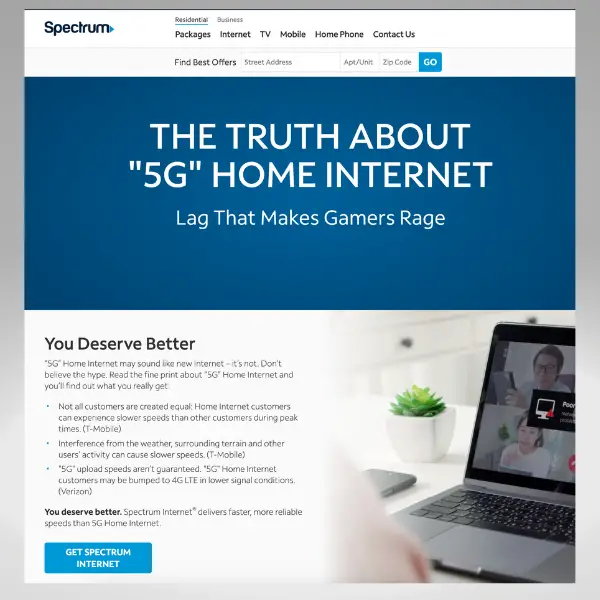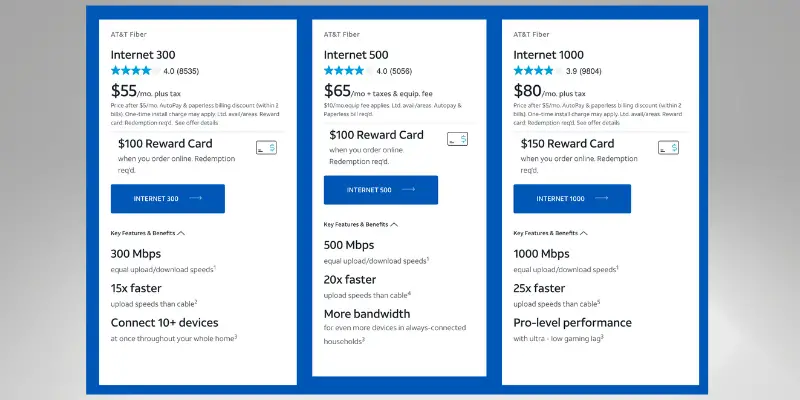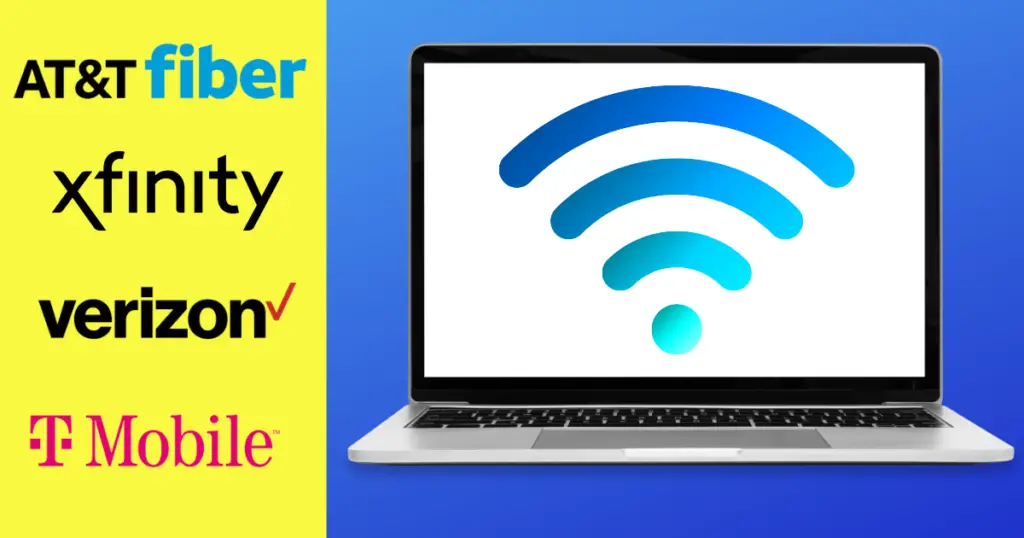At a time when the price of everything seems to be going up, you may be able to save money by switching home internet providers.
Over the past few years, I’ve tested:
- Fiber internet (AT&T Fiber)
- Cable internet (Xfinity)
- 5G home internet (T-Mobile and Verizon)
Which one should you choose? In this article, I’ll break down the pros and cons of these three types of internet services. Let’s get started with more on the big disruptors.
5G Home Internet
T-Mobile and Verizon’s 5G home internet services are stealing away customers from other providers, which is leading to better deals from fiber and cable internet companies.
In fact, T-Mobile now refers to itself as the “fastest growing home internet provider.”
Both Verizon and T-Mobile’s services cost $50 to $60 per month, but the price drops if you bundle internet service with a qualifying phone plan.
You can sign up for only the internet plan with either service, but bundling is a way to save.
| Verizon 5G Home Internet | T-Mobile 5G Home Internet |
| 5G Home Plan: $50 per month with Auto Pay $35 per month with select mobile plans 5G Home Plus: $70 per month with Auto Pay $45 per month with select mobile plans | $50 per month with Auto Pay $40 per month with Go5G Next, Go5G Plus or Magenta MAX mobile plan |
| Get the latest Verizon deals and pricing | Get the latest T-Mobile deals and pricing |
Besides the affordable pricing, people choose T-Mobile and Verizon’s plans because they remove some of the gotchas that other internet providers are known for.
5G home internet features:
- No contracts
- Equipment included
- Unlimited data
- Easy self-installation
Another draw is that the price won’t go up after the first year. For example, Verizon typically guarantees the price for two or three years.
These 5G home internet services use cell phone towers to bring internet to your home.
Cable competitors like Xfinity and Spectrum have made attack websites to highlight the downsides of relying on 5G home internet for your household.
These websites focus primarily on speed and reliability with 5G services.

I tested data speeds for T-Mobile and Verizon’s services. T-Mobile’s download speeds averaged more than 100 Mbps, and Verizon’s 5G home internet averaged nearly 200 Mbps.
You’ll also notice download speeds slowed later in the day, which is typical from my experience.
| Verizon 5G Home Internet | T-Mobile 5G Home Internet | |
| 11:00 AM | 247 Mbps | 134 Mbps |
| 12:00 PM | 201 Mbps | 145 Mbps |
| 1:00 PM | 185 Mbps | 102 Mbps |
| 2:00 PM | 220 Mbps | 159 Mbps |
| 3:00 PM | 255 Mbps | 113 Mbps |
| 4:00 PM | 252 Mbps | 129 Mbps |
| 5:00 PM | 192 Mbps | 132 Mbps |
| 6:00 PM | 173 Mbps | 47.4 Mbps |
| 7:00 PM | 160 Mbps | 51.1 Mbps |
| 8:00 PM | 96.6 Mbps | 26.1 Mbps |
| AVERAGE | 198.2 Mbps | 103.9 Mbps |
Your experience with 5G home internet won’t be the same as mine — it may be better or worse. The performance will vary depending on the signal at your address.
That’s one reason why eligibility is limited. Check Verizon and T-Mobile’s websites to confirm availability.
For everyday internet tasks like streaming video and browsing the web, Verizon and T-Mobile 5G home internet get the job done. However, heavy gamers will likely prefer fiber or cable internet services that have lower ping/latency.
Both 5G home internet services have money-back guarantees, so you can try one out before canceling your existing service.
See my related article comparing T-Mobile and Verizon’s 5G home internet services.
Cable Internet
For a lot of people, cable internet is their best and only high-speed internet option. But providers like Xfinity and Spectrum are responding to the pressure from 5G home internet services.
As someone who had Xfinity for many years, I made a list of the things I didn’t like about the service:
- Price goes up after the first year
- Wi-Fi equipment is extra
- Data cap (no unlimited data)
- Contract required
However, Xfinity has run limited-time deals that remove most of those gotchas that customers have come to expect from cable providers.
For example, deals with stable pricing for up to two years, equipment included and no contracts.
You have to wonder: Would Xfinity be offering better deals if T-Mobile and Verizon’s 5G home internet services didn’t exist?
Most of the people I hear from don’t have a problem with their cable internet service. Instead, it’s the pricing tactics that have them looking for any other option.
For those who are happy with Xfinity’s service, you can get a discount on your internet bill if you sign up for Xfinity Mobile.
This is a wireless service that runs on Verizon’s network.
I’ve tested Xfinity Mobile several times since it launched in 2017 and can tell you that it’s both affordable and reliable. Learn about the pros and cons in my updated review.
If you have Spectrum for internet, Spectrum Mobile is a similar wireless service that uses Verizon’s network.
NEW OPTION: Comcast announced in April 2024 that it’s launching cheaper internet and phone plans under a prepaid brand called NOW. The internet plans start at $30 a month — and include unlimited data and equipment.
Fiber Internet
Depending on where you live, fiber internet may be the most expensive option. However, I do like fiber internet and think it provides the best overall experience from my testing.
I’ll use AT&T Fiber as an example. That’s my former internet provider.

For my area, the service is marketing plans that range in price from $55 per month to $80 per month. But what’s most interesting about AT&T is the service’s pivot to straightforward pricing.
AT&T straightforward pricing details:
- No equipment fees
- No annual contract
- No data caps
- No price increase after 12 months
Is this new commitment to straightforward pricing a response to competition from 5G home internet services? It sure looks that way.
One thing to be aware of with fiber internet providers like AT&T is that they heavily promote gig-speed plans. Most people do not need anywhere near that speed!
AT&T Fiber’s 300 Mbps plan is adequate for most consumers. Perhaps the 500 Mbps plan would be ideal for larger households, especially if you do a lot of online gaming and video conferencing.
Those who upload large files to the internet will also prefer fiber because it offers equal upload and download speeds.
With fiber, you may have to pay a one-time fee of around $100 if a technician needs to come out to your home. Self-install kits may be available in certain situations.
I’ve also noticed that AT&T Fiber routinely offers reward cards for new and returning customers.

I canceled internet service with AT&T Fiber three months ago to rely solely on 5G home internet. Only a few weeks later, AT&T offered me a $200 Visa reward card to switch back.
5 Things You Need to Consider
When I recently polled my YouTube community, about 75% of those who responded said they pay $50 or more per month for home internet service.
Before you sign up for a new plan, here are five things to consider:
- Pricing: How much does it cost? Is a contract required? Any deals?
- Equipment: Is it included or how much will it cost?
- Data Caps: Does the plan include unlimited data?
- Speed: Am I paying for more speed than I really need?
- Installation: Do I need to pay for a technician or can I do it myself?
I have a new comparison tool on MichaelSavesDeals.com that lets you enter your address and see the best available internet deals in your area.
Which internet service do you have and how much is it? Let me know in the comments below!

I appreciate that you discussed how If a technician needs to visit your house, fiber may need a one-time payment of around $100. In some cases, self-install kits could be offered. My daughter, who requires fast internet for her daily online classes, will find this useful. While looking for a solution, I came across this article. I’ll have it in mind and start looking for a trustworthy supplier straight now.
Thanks for the review.
Dear Michael,
I am desperate to “cut the cord” with my cable company. However, I will need a new router for high-speed wi-fi. Neither one of the ISP’s (cable & phone company) where I live are terribly reliable and customer service is terrible, but costs are comparable.
The phone company offers only 50 Mbps., while cable offers several different speeds. I was hoping for 5G but, it’s not available. What is the minimum speed needed for internet service used for HD streaming and one computer? Is there a combination modem/router (compatible with cable or phone) that won’t become obsolete soon? What should I look for? Forgive me, if you’ve answered these questions already. I admit to being a “computer dummy”. Thank you for all of your advice.
Hi there! You could probably get by with 50 Mbps if you had to! I have more in my cord-cutting guide: https://michaelsaves.com/streaming/how-to-cut-the-cord/
I wrote an article about gateways that are compatible with Xfinity at one point. Details: https://michaelsaves.com/save-money/xfinity-internet-equipment-fee/